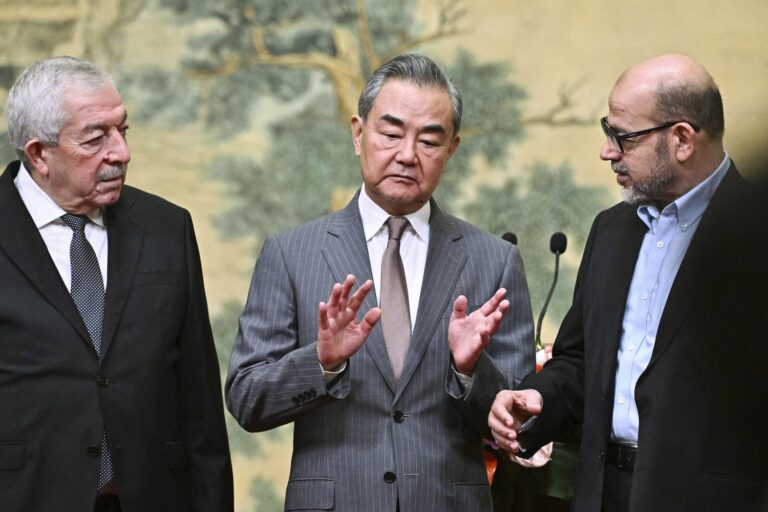BEIJING — Senior representatives of the Palestinian parties Hamas and Fatah signed a joint declaration in the Chinese capital Beijing on Tuesday, aiming to forge unity and end a decades-old rift amid intensifying fighting with Israel in Gaza. upon.
The agreement, called the “Beijing Declaration on Ending Division and Strengthening Palestinian National Unity”, was announced at the end of a three-day conference here and Chinese Foreign Minister Wang Yi today hailed it as a landmark, calling it a “historic moment for the cause of Palestinian liberation”.
The deal also highlights China’s ambitions to play a more prominent diplomatic role in the Middle East and rival the U.S. as a mediator on the global stage. The deal came just a year after China helped broker a deal between Iran and Saudi Arabia that restored diplomatic ties between the two countries, unsettling many in Washington.
The eight-point declaration states both sides agree to “establish a transitional national unity government agreed upon by the Palestinian factions,” according to a copy of the document seen by NBC News.
It further states that “the new government will confirm the unity of the West Bank, Jerusalem and Gaza, exercise power and jurisdiction over all Palestinian territories, and begin preparations for the unification of all Palestinian institutions in the territory and the holding of general elections.”
The signatories also agreed to “resist and thwart any attempts to expel our people” from the Gaza Strip, the West Bank and Jerusalem, and to “affirm the illegality of settlements and settlement expansion in accordance with the resolutions of the United Nations Security Council and the UN General Assembly, and the opinions of the International Court of Justice.”
A Palestinian official familiar with the declaration told NBC News that what’s important now is “implementation on the ground.”
“Hamas’ preferred way out would be to embed itself in some kind of bipartisan Palestinian governance structure,” Jon Alterman, director of the Middle East program at the Washington-based think tank Center for Strategic and International Studies, told NBC News on the eve of the Palestinian talks.
“We don’t know if it will be accepted by other countries, such as the United States, Israel or Europe,” he added.
President Joe Biden’s administration has proposed a plan that would ultimately lead to a permanent ceasefire in the Gaza Strip, the release of all hostages and extensive post-war reconstruction. It also outlines a plan for a renewed Palestinian Authority to govern Gaza once the conflict ends. Israel has rejected the plan but has not offered a credible alternative for who would govern Gaza and how.
China is not directly involved in the U.S.-led effort to secure a ceasefire between Israel and Hamas in Gaza, but it wants to play a role in post-war reconstruction. China has also made no secret of its willingness to host an international peace conference, and hosting Palestinian unification talks would be seen as a diplomatic step towards that end.
“(China) has nothing to lose by hosting such an event,” Fariz Mehdawi, the Palestinian Authority’s ambassador to China, said in a recent interview with NBC News in Beijing. “In diplomacy, you either make a good political move or it’s considered a failure.”
After a first round of talks in April ended with little progress, China did not announce that the talks had taken place until participants had left the country, and a second round planned for last month was called off after Hamas and Fatah withdrew at the last minute.
Fatah and Hamas have long been locked in a power struggle, but the rift deepened in 2007 when Hamas violently seized control of the Gaza Strip after the previous year’s elections.
The rift has led to criticism that the Fatah-controlled Palestinian Authority, which can only govern parts of the occupied West Bank, is undermining its legitimacy, the researchers said. Palestinian Center for Policy Studies and Research. Israel has exercised power over both the West Bank and Gaza in different ways.
Repeated attempts to heal the rift have been thwarted by bitter divisions and a Western reluctance to accept any government, including Hamas, without explicitly recognising Israel.
“The historical rift between Hamas and Fatah is deep, with long-standing hostility and ideological differences,” said Maria Papageorgiou, a lecturer in politics and international relations at Britain’s University of Exeter.
She added that successful mediation between the different factions would be a “major diplomatic victory” for China.
Palestinian Ambassador Mehdawi said, “Beijing cannot call for peace talks when the Palestinians themselves have not restored their own homes.”
According to Chinese state media, Foreign Minister Wang Yi said that as a result of the agreement, Hamas would come under the umbrella of the Fatah-led Palestine Liberation Organization and the PLO would become the “sole legitimate representative of the entire Palestinian people.”
China “has a strong national interest in having a seat at the adult table in international diplomacy,” Alterman said.
“China wants to participate in any major diplomatic event to end this conflict and wants to play a key role in it,” he added.

